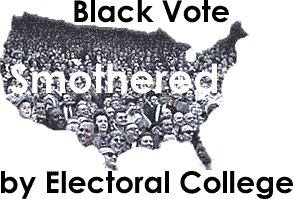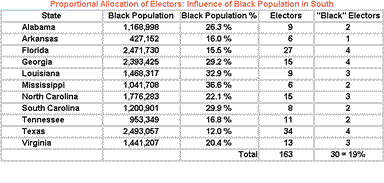
Issue 111 - October 28 2004
Printer Friendly Version
|
“I am convinced… that the black vote is going to be not only a bigger vote than ever before, it is the swing vote.” Rev. Jesse Jackson, Sr., speaking on CNN Rev. Jackson is right about the raw numbers of African Americans who are expected to go to the polls on November 2. However, most of the national Black voting population will “swing” neither their home states nor the presidential election. Fifty-five percent of the Black population resides in the South, and every four years their votes are drowned in a sea of Republican red. For presidential election purposes, except for the besieged Black citizens of Florida, the southern African American franchise is negated by the Electoral College – a true 21st century vestige of slavery. The whites of the Old Confederacy – once Democrats, then rebels against the Union, then Democrats again, and now mostly Republicans – practice racial bloc voting to keep Black minorities – ranging from 16 percent (Arkansas) to 36 percent (Mississippi) – in political check within state boundaries. But it is the Electoral College that chains Black southern voters to their white political antagonists, in effect forcing Blacks to add the weight of their franchise to that of the Republican Party’s racist base, every four years. We vote against their candidate – they walk away with the southern half of Black America’s electoral votes. No Americans are more adversely affected than Blacks by the profoundly undemocratic workings of the Electoral College, the rich white man’s arrangement hatched in the backrooms of the 1787 Constitutional Convention, in Philadelphia. The same Convention enshrined slavery as untouchable by the new national government for 20 years, and designated slaves as three-fifths men for the purposes of awarding representation in Congress. Slave masters were made more powerful than other white men by exercising the franchise that was denied the slave. Although the conventional wisdom is that the Electoral College was devised solely to protect smaller states, the scheme was at least as advantageous to the southern slave-holding aristocracy, who sought to narrow the franchise in their own states as much as possible, while also limiting the federal government’s power to tamper with their “peculiar institution.” The slave states amassed blocs of electors all out of proportion to the actual voting public, a bloated electoral tyranny that lasted – except for a brief intermission during Reconstruction – until passage of the Voting Rights Act in 1965. From the beginning, the Electoral College was a “State’s Rights” issue in the now-familiar, racist sense of the term. Yale Law School professor “the electoral college was designed to and did in fact advantage Southern white male propertied slaveholders in the antebellum era. And in election 2000, it again ended up working against women, blacks, and the poor, who voted overwhelmingly for Gore.” The Electoral College’s “roots aren't as principled as we think,'' Prof. Amar told the San Jose Mercury News, October 24. The Colorado model The most recent challenge to Electoral College bondage comes from the Republican-leaning state of Colorado, in the form of Amendment 36, a November 2 ballot initiative. Although the Electoral College can only be abolished by the constitutional amendment process, requiring the assent of two-thirds of both Houses of Congress and three-quarters of state legislatures, the states may allocate their electoral votes any way they choose. Coloradans led by former Howard Dean campaign manager Rick Ridder want to split the state’s nine electoral votes proportionally – meaning five to four in a close race such as is expected this year. Amendment 36 would take effect immediately upon passage, and could possibly tip the balance of the election. Had Amendment 36 been in force in 2000, Al Gore would have hit the magic number 270 with three of Colorado’s proportionally awarded electoral votes – and without Florida. If Amendment 36 passes – and clears court hurdles – Colorado would become the first state to award electors in a truly proportional manner. States get one electoral vote for each Senator and congressperson. Nebraska and Maine, the only current defectors from the “winner take all” system, award the statewide presidential winner two votes, and candidates win one elector for each congressional district carried. The formula hasn’t made a bit of difference in these two rather racially homogenous states – in Maine’s case, very homogenous – because the winning presidential candidate has also carried each congressional district. The states’ electoral votes have never been split. However, the Colorado model would work a sea change in the South, where the Electoral College is not merely a quaint “antique,” as the Los Angeles Times editorialized on October 24, but a blood-soaked tool of racial oppression that renders Black voters less than 50 percent citizens in presidential elections. We need to part the “red” sea, and free the Black South from the white-folks-take-all electoral grip. The Black presidential impact
Click for large printer friendly view of table Under the current winner-take-all system, only the Black voters of the “battleground” state of Florida have a chance to influence the presidential election – and everyone knows it. Despite continuing gains in local and state contests, Black southern impotence in the presidential race has vast ramifications. It is as if the national Black population were sliced in half every four years, the southern portion gang-pressed into empowering the White Man’s Party. Proportional electors would bring the Black South to full stature. The region’s 30 Black-weighted electoral votes would represent more than the currently hotly contested states of Arizona (10), Colorado (9), Nevada (5) and New Mexico (5), combined. Black Georgia alone would account for as many electoral votes as New Hampshire (4), also considered a prize in these final days of the campaign. Dr. David Bositis, of Washington’s Joint Center for Political and Economic Studies (JCPES), agrees that proportional electors in the South “would substantially increase the influence of the Black vote. There are several southern states where there is heavily racially polarized voting and the white population dominates the elections, no matter how strongly Blacks turn out.” The white vote sometimes “breaks 80-20 Republican,” he said. This is not just about winning national elections. Under the current system, southern white Republicans are rewarded for delivering the whole Electoral College pie, while African Americans scramble to figure out how they can impress upon the national Democratic apparatus that state party organizations would cease to exist were it not for Black voters. Instead, power in state parties devolves to white Democrats, who imprint the organizations with corporate Democratic Leadership Council ideology. The DLC rules because it can deliver corporate cash, while Black southern Democrats cannot deliver electoral votes. Conventional wisdom wrong The JCPES’s Dr. Bositis believes proportional allocation of electors “is not going to happen” because “institutional forces are too strong.” We are not so pessimistic. The conventional wisdom is that smaller states will fight tooth and nail to keep the system as it is. But Maine (4 electors) and Nebraska (5) are on the small side, and they broke with winner-take-all, albeit with a formula that Dr. Bositis says, correctly, “would probably be worse than the current system” if applied in the South. The brazen gerrymandering of Texas is proof enough that the Maine-Nebraska rules – awarding electors based on presidential candidates’ victories in congressional districts – will not serve African Americans well. Black congresspersons represent 17 southern districts, subject to the redistricting machinations of state legislatures. This does not adequately represent the Black presence in the South. The Colorado formula is the most democratic – and worth fighting for in state legislatures. (Only a few states allow such changes by referendum.) Strong majorities of Americans – in big states and small ones – favor abolishing the Electoral College altogether. Colorado’s Amendment 36 is the closest thing to it, without going through a (very long and grueling) U.S. Constitutional amendment process. A legislative remedy along those lines would have mass appeal. North and South, the winner-take-all electoral system is the most glaring impediment to Black collective political expression – a prerequisite to self-determination. Half of our votes will not be counted in the Electoral College, next week. We must create a system in which we can bear witness to the fruits of our numbers, and give credit to ourselves, so that we may truly feel the power – and exercise it. |
www.blackcommentator.com Your comments are welcome. Visit the Contact Us page for E-mail or Feedback. |



